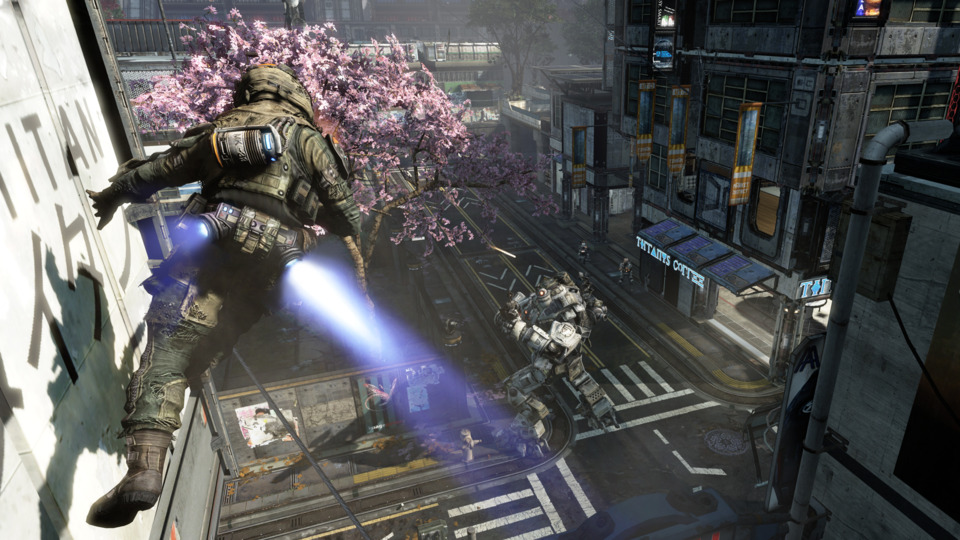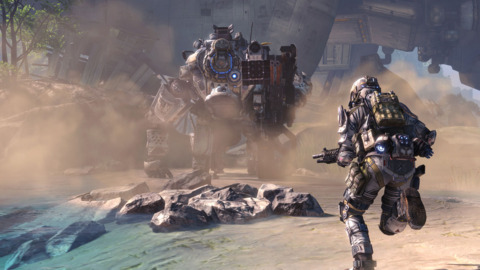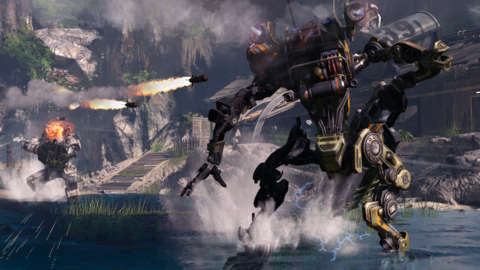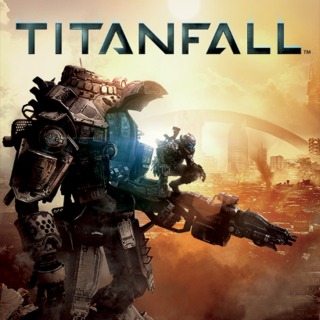Titanfall's focus on player mobility and big-ass robots sets it apart from other competitive shooters and makes much of the game look like one big highlight reel.

Titanfall is a game for people who like competitive first-person shooters, but have gotten tired of seeing the same basic action year in and year out. If you already don't like (or have, at some point in the past, liked) games like Call of Duty, there's a very good chance that Titanfall will hold zero appeal for you. It is not here to save you, it is not rewriting the book on competitive action games, it will not wash your car, tuck you in at night, or fix you chicken soup if you get the flu. Titanfall doesn't have time for that nonsense; it's way too focused on being a great multiplayer shooter for people who already enjoy them. That leads to an interesting conundrum and a package that manages to be laser-focused on a specific type of gameplay, which can make it also feel a little too small. It all comes down to how much you already enjoy these games and how badly you want something that updates the Call of Duty formula in some new, exciting ways.

This game is "multiplayer-only," meaning you can't even get into the game's brief training mode without first connecting to an online server. It has a campaign mode, but this is really just a set of standard multiplayer matches with some assorted story-focused dialogue layered over the action, like someone decided to put on a radio play while you shoot at people. It doesn't have very many modes to its competitive multiplayer either--there are five, to be exact, and two of them are identical in basic gameplay but slightly different in the way points are scored. By having equivalents to Call of Duty's Team Deathmatch and Domination modes, Titanfall checks the most popular boxes, but when you compare it to the three-games-in-one-for-the-same-price approach of Call of Duty, Titanfall feels small. This is probably the point where I should remind you that both games launched at full price.
That all sounds pretty damning, and if you're a value-minded consumer who wants tons of variety out of a game, Titanfall is a tough sell. But behind the short list of modes and no-stakes storytelling lies some extremely satisfying and fluid gameplay. Titanfall looks slim on paper, but in practice it's positively explosive for a couple of different reasons. First, you have more mobility as a player. The soldiers in Titanfall can double jump and run along walls, and you can combine those moves again and again to get up onto rooftops and climb high walls. The verticality of the action means that there could be an enemy pilot hiding just about anywhere, and you're forced to adapt and start looking around everywhere, instead of just keeping your eyes focused at ground level and the obvious perches that make up most shooter maps these days. Moving around in Titanfall is rewarding and fun, at times feeling like you're playing a light version of Mirror's Edge, but never so much that it forgets that your primary mission is to shoot people.

The movement creates amazing scenarios that you want to tell people about, like the time you ran along a wall to clamber up to a rooftop only to leap off of that roof into a window across the street, where you caught some unsuspecting fool slipping and kicked him in his stupid face... and then you just kept running, trying to do it all again. Or the time you hauled ass around the outer edge of the map, shot every single AI soldier you saw, snapped a couple of necks, captured a control point, and immediately made a giant robot drop out of the sky. Camping out on a roof or in a window is certainly possible in Titanfall, and the game has sniper rifles in an attempt to support this type of gameplay, but players move so quickly and erratically that snipers feel like they're at a real disadvantage... which further incites more players to run around like maniacs at all times. In 20 or so hours with the game I've had a sizable list of great-looking moments where the mobility and shooting collide in a way that makes you feel unstoppable. It's a game that feels like it was built for highlight reels.
The other big differentiators are the titans themselves. These big robot suits drop from the sky in impressive fashion when pilots call them in, and they let you stomp and dash around levels with some amount of authority. But they aren't invincible. The shields on a titan recharge, Halo-style, but the underlying armor does not. This, along with lengthy weapon reload animations, incentivize you to occasionally back off and recharge. The titans are actually somewhat fragile, so you don't necessarily need to fight titans with titans, as every player has a dedicated slot for anti-titan weapons that can do serious damage. The interplay between players on foot and players in their robots is great, with pilots attempting to poke out, paint a titan long enough to lock-on, and fire big missiles before getting noticed, gunned-down, stomped, or punched apart by a giant robot fist. That said, I found titan-on-titan conflicts to be somewhat monotonous and occasionally even sluggish, since it's the only time the game asks you to hang back and prepare instead of going full-bore at the competition. But hey, let the titans blow up... you can always get another one.

Titan deployment is governed by a timer. That timer ticks down naturally, but you can also reduce the required time by shooting enemies. Killing players and shooting at titans take significant chunks off your clock, but the maps are also peppered with AI foes who aren't smart or strong enough to kill you unless you're extremely careless. They keep you on your toes and, yes, killing them also takes time off your titan clock, giving you a decent incentive to farm those AI enemies as you run from place to place. You might think of it as the Call of Duty killstreak system, but instead of only rewarding players who play well, it rewards everyone--but players who shoot well are rewarded much more frequently.
Like just about every other modern shooter, Titanfall has you earning experience points, gaining levels, and unlocking different customization options. You'll quickly gain the ability to create custom loadouts for both your pilot and your titan, and each has its own set of weapons and perks. As is my custom, I settled on fully automatic assault rifles as the main weapon for both my pilot and titan. The game has a short list of other weapons, but range-reduced sub-machine guns and shotguns feel too limited when faced with the larger-than-average map sizes. For players who especially like getting behind enemies or can't aim, the one unique option for primary pilot weapons is a smart pistol that behaves like lock-on targeting in a Panzer Dragoon game. AI-powered fodder goes down in one lock-on hit, but human pilots won't drop unless you lock onto them with three separate shots. Is it unbalanced? A baby gun for babies? I'm no balance designer, but the smart pistol doesn't feel all that powerful. Locking on three times takes longer than it would take to just aim at and shoot an enemy with any other weapon, and If you stand around long enough to get locked onto three times, you probably deserve to get gunned down.

Titans have more options in addition to basic full-auto and semi-auto rifles, like a quad rocket launcher, a railgun, a charged energy bolt, and a grenade launcher that fires three grenades at once. The titan loadouts seem more interesting than the pilot weapons because they can help you play slightly different roles. The assault rifle and lighter weapons are fast-firing and handy against pesky pilots and still useful in titan-on-titan skirmishes. The heavier weapons, as you might expect, take a little longer to get going, but they're much more devastating to a titan's armor. Overall, most of the weapon options feel a little staid. You might expect a world that allows humans to warp to faraway planets and call in robots from space to offer up slightly edgier weapons than SMGs and sniper rifles.
The online-only nature of Titanfall means that it's only as good as its server infrastructure. In pre-release testing, I ran into a few cases where the latency would spike, causing AI opposition to seize up and enemy titans to halt, mid-dash. On launch day, the game ran into some bumps, occasionally dropping players from games or lobbies, making it difficult to get into a game at times. This seems like it was mostly smoothed over by the end of its first 24 hours on sale, and the network responsiveness has been solid, with none of the lag spikes or other issues I saw prior to the game's launch. It's a little disappointing that the game doesn't have an option for private matches or any sort of LAN support, but what's on display seems to work well.

The frame rate in Titanfall is uneven on the Xbox One and though it's usually fine, it can get downright nasty in specific situations. In one Last Titan Standing match--where every player spawns in a robot suit--several players crammed their mechs into a tight area and began duking it out, and the frame rate dived down to what must have been single digits per second. Even out in wider areas, the game feels a little hitchy from time to time, and there's noticeable tearing throughout. The visuals in Titanfall look nice, but that's mostly due to some solid art and interesting design, not the performance. On the PC, the game scales to fit a lot of different configurations, so you can essentially buy your way out of the console version's performance issues. On a proper machine, the textures look great and the smooth frame rate really goes a long way.
I'll say it again, since we should probably wrap this up: Titanfall is a very specific game built for a specific type of person. When you add it all up, the list of available content and the various options for speccing out your pilot feel light, and that might make this game a little hard to swallow at $60. But getting into these wild situations and shooting your way out of them feels fresh and fun in a way that the other shooters on the market don't. If you like the basic form but need more of a twist on how you move and how you shoot, Titanfall's core action is extremely satisfying, which makes it a little easier to overlook the lack of available modes.
Editor's note 03/13/2014: Due to this game's online-only requirement, this review originally went up without a score on it. This was done to afford us the time to gauge how it performs in a real, retail environment. When converting this into a scored review, text discussing the online portion of the game was updated to reflect the game's post-launch performance. Text discussing the specifics of the PC version's visuals was also added.
Metacritic User Score
Based on 2596 reviews
Titanfall

- 11 March 2014
- Respawn Entertainment
- Bluepoint Games
- Electronic Arts
- ESRB: M
- OFLC: MA15+
- PEGI: 16+
Set in a far-flung, mech-filled future, Titanfall is the first first-person shooter built by Respawn Entertainment, the studio formed by ex-employees of Call of Duty developer Infinity Ward.